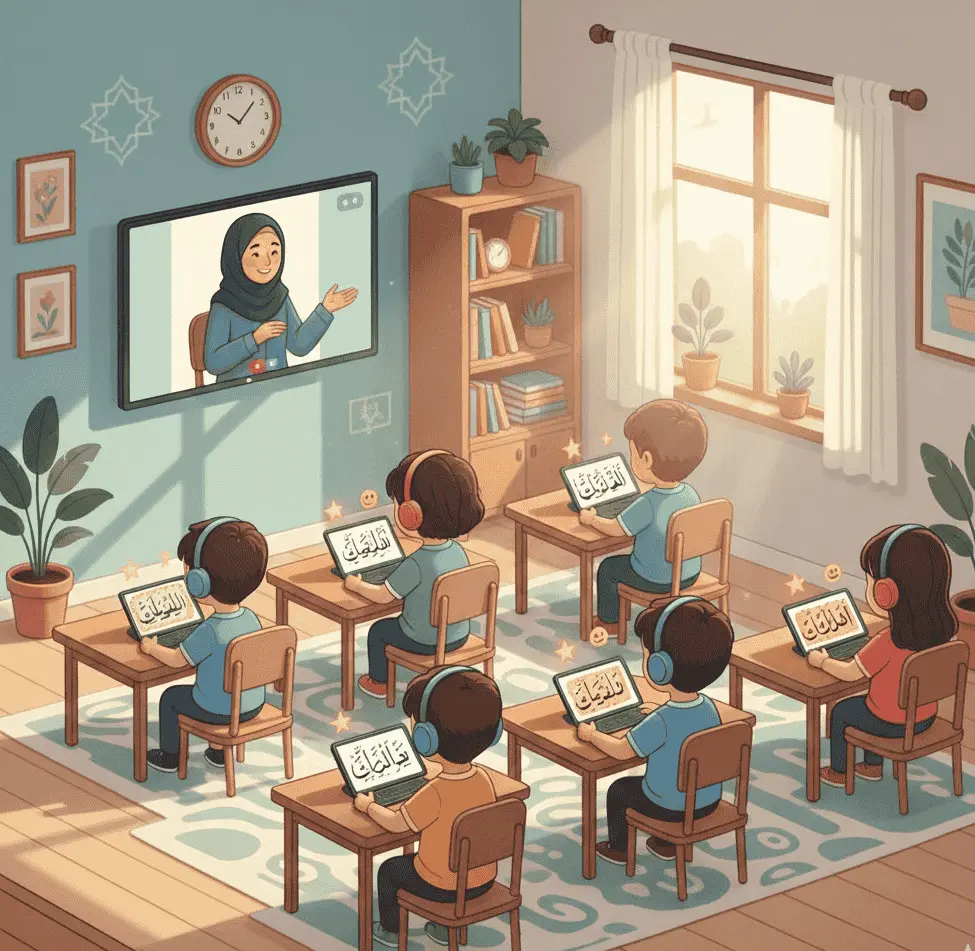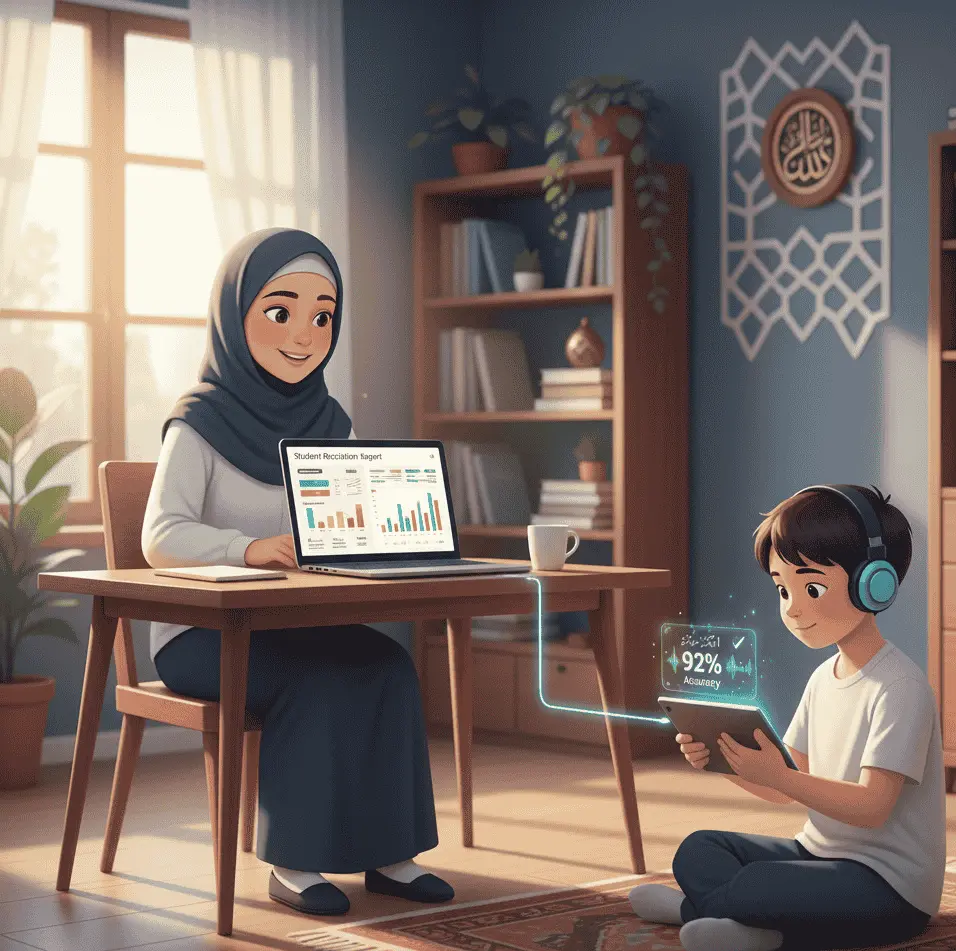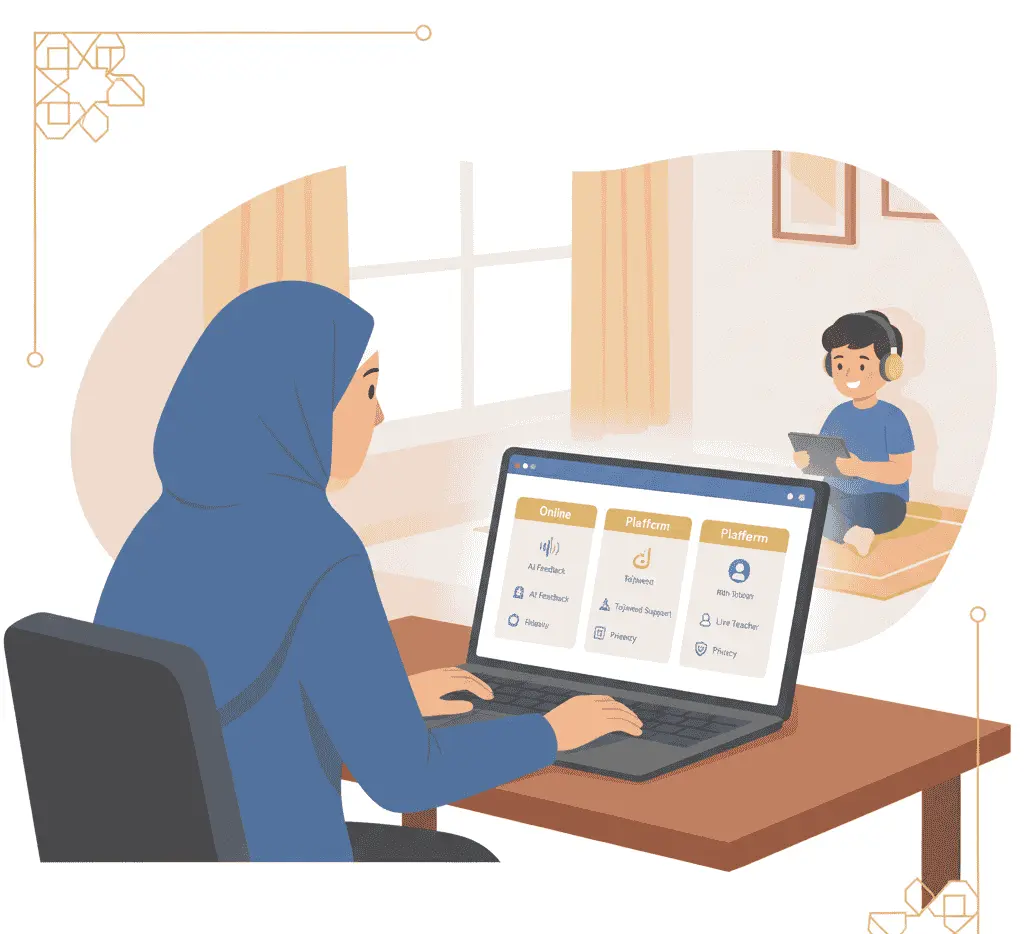Introduction – Small Tools, Big Difference
For centuries, Quran learning has been a human business: teacher, student, correction, repetition. Recently, a new set of tools – broadly called Automatic Recitation Feedback (ARF) – has begun to change how that loop happens online. These systems listen to a student’s recitation, detect pronunciation or tajweed issues, and offer immediate, actionable feedback.
Families from United States of America to Australia, United Kingdom to Canada are now asking: Can AI Quran learning tools genuinely help my child?
The short answer: when used carefully, they make practice smarter, faster, and more measurable – while still depending on real teachers for spiritual guidance.
What Exactly Is Automatic Recitation Feedback?
Automatic Recitation Feedback (ARF) is a class of software that uses voice recognition and pattern matching to analyze Quran recitation.
At its core, it does three main things:
• Listens – the student recites; the tool records the audio.
• Analyses – algorithms compare the student’s sounds to correct recitations and tajweed rules.
• Responds – the system highlights errors (e.g., wrong makhraj, short/long vowels, weak ghunnah) and suggests corrections or drills.
Different platforms call this feature by various names – recitation scoring, tajweed analysis, or AI Quran tutor – but the aim is the same: to give immediate, objective feedback so learners can self-correct between teacher meetings.
How the Technology Works (In Simple Terms)

These systems use several well-tested components:
• Voice recognition tailored to classical Arabic phonetics (not off-the-shelf tools).
• Pattern libraries built from recordings of expert reciters to model correct tajweed.
• Scoring engines that rate pronunciation, elongation (madd), and nasalization (ghunnah).
• User interfaces that show error highlights, playback comparisons, and repeatable drills.
Quality matters.
The best tools are trained on authentic recitations and account for Quranic Arabic subtleties. Poorly designed voice tools may mislabel correct variations as errors – so platform choice is crucial.
Why ARF Is Useful – Real, Practical Benefits
- Faster Feedback Loop
Students get instant feedback instead of waiting for a week:
“Hold this madd one beat longer” or “Make the ghunnah fuller.”
This shortens the learning cycle and reinforces accurate habits. - Better Accuracy
Automated systems catch repeatable mistakes (e.g., confusing qaf with kaf) that can easily become habits if unnoticed. - Higher Engagement
Gamified scoring, badges, and progress graphs motivate children to practice regularly – turning short daily drills into consistent improvement. - More Effective Teacher Time
Teachers receive analytical reports highlighting problem areas, allowing live lessons to focus on meaningful corrections instead of repetition. - Accessibility
For students who don’t have access to local tajweed experts, ARF acts as a reliable digital mentor between lessons.
Where ARF Helps Most (and Where It Doesn’t)
ARF Helps Most With:
• Repetition drills and accurate timing (madd lengths).
• Detecting common pronunciation confusions.
• Providing consistent practice for memorization (hifz).
• Motivating learners with short, measurable tasks.

ARF Doesn’t Replace Human Teachers For:
• Spiritual tone, melody (maqam), and interpretive nuance.
• Emotional or moral guidance during correction.
• Granting ijazah or judging complex recitation differences.
Think of ARF as a practice partner, not a replacement.
The human teacher remains the mentor and guide.
Teachers + AI: A Partnership, Not a Contest
The best online Quran academies use ARF to amplify teacher effectiveness, not replace them.
A balanced model looks like this:
- Students practice daily with ARF to fix simple errors.
- Weekly lessons with teachers address deeper tajweed and spiritual meaning.
- Teachers review ARF data to plan targeted exercises.
- Parents monitor dashboards to support consistent learning.
This preserves the heart of Islamic education – human mentorship with modern efficiency.
Choosing a Platform With Trustworthy Recitation Feedback
When selecting a Quran learning platform, ensure it includes:
• Specialized voice models for Quranic Arabic.
• Tajweed-aware scoring that aligns with accepted rules.
• Playback comparison between student and model reciter.
• Privacy protection (recordings under parental control).
• Teacher integration for feedback reports.
• Trial lessons to test the accuracy of feedback.
In the US, UK, Australia, and Pakistan, families often prefer platforms that also provide:
• Female tutors,
• Timezone-friendly schedules, and
• Parent dashboards.
• Limitations and Ethical Considerations
• False positives: Some dialects may be flagged incorrectly.
• Over-reliance: Students may miss emotional or spiritual depth if they depend solely on ARF.
• Access gaps: High-quality tools need stable internet and devices – not all learners have equal access.
The Near Future – What to Expect
Upcoming ARF technology will bring:
• Adaptive lesson plans based on individual progress.
• Multi-voice comparisons for deeper correction.
• AI-generated hifz schedules tailored to each student’s rhythm.

Yet, one truth remains:
Technology enhances accuracy – but sincerity, niyyah, and guidance still come from the teacher.
Practical Routine – Blending ARF With Teacher Time
| Frequency | Activity | Duration |
|---|---|---|
| Daily | ARF-driven micro-drill (madd, ghunnah, short ayah) | 8–15 mins |
| 3× Weekly | Offline Mushaf reading with audio comparison | – |
| Weekly | Live lesson for advanced corrections | 20–30 mins |
| Monthly | Teacher review of ARF reports | – |
This plan keeps screen time balanced while combining AI precision and human care.
FAQs – Short & Practical
A: Best suited for slightly older kids who can imitate and understand feedback.
A: They reinforce it through feedback, but teachers teach the deeper theory and spirituality.
A: Never. It’s a support tool, not a substitute for guidance.
Conclusion – A Helpful Tool, Used Wisely
Automatic Recitation Feedback is changing the rhythm of Quran learning online — making it more responsive, personalized, and measurable.
For families across the US, UK, Australia, and Pakistan, ARF tools make daily Quran practice practical and rewarding when paired with live teacher sessions and parental support.
Technology can guide the tongue – but the heart still learns from a teacher.
Use ARF wisely, keep the mentor close, and watch your child’s accuracy, confidence, and love for the Quran grow.



